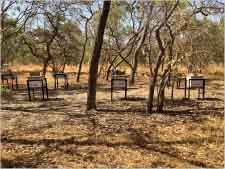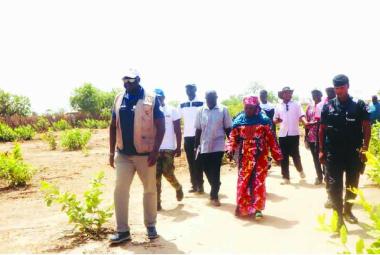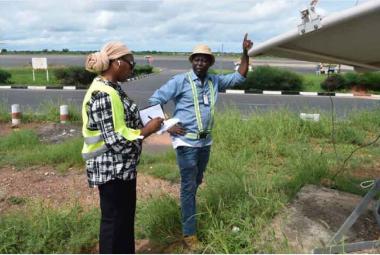By Isatou Jawara
The Government of the Gambia through the Ministry of Environment in partnership with the United Nations Environment Programme (UNEP), secured funding from the Green Climate Fund (GCF) to implement a six-year project, the Large-scale Ecosystem-based Adaptation project (EBA).
The EBA Project is to develop a climate resilient and natural resource-based economy.
The project has employed several approaches designed to bring together different players involved in its execution. Notably, the project is designed from a systems perspective – bringing together policymakers, community, experts, government agencies, private sector, development agencies and academia – aimed to bring sustainable solutions to the economic, social and environmental challenges in The Gambia. Some of the adapted approaches of the Gambia Natural Resource Sector.
In this exclusive interview with the EBA Project Coordinator Dr Malanding Jaiteh, he explained the impact of climate change, highlighted the project’s achievements and the restorations activities across the regions; mostly LRR CRR and URR and their impacts on climate change mitigation in The Gambia.
Mr Jaiteh said climate change has been in the world for some time now but that over the last thirty to forty years it has become very clear that human activities; such as pollution, emission of hazardous gases and chemicals, as well as land degradation for agriculture or industrialisation, have resulted in the increase in temperature as a result of increase in carbon dioxide in the atmosphere.
However, he explained that these emissions and their impacts globally, differ from place to place; and that in The Gambia, one of the most evident impacts of climate change is the reduction in rainfall.
He recalled that in the 60s, 70s and part of the 80s, rainfall begins in The Gambia from late May until October. “But now we have seen a very significant shift of this during the rainy season which sometimes begins in July or even the end of July. And of course the amount of total rainfall across the country used to be more than 1,000 mm but now rainfall records for the whole rainy season fall way below 1,000 mm,” he posited
Commenting on the project, Dr Jaiteh explained that EBA project is conceived to revitalise these ecosystems that are mainly degraded in The Gambia and to improve their conditions so that those people whose livelihoods depend on cutting down trees can also improve, by growing crops and doing other activities that will not destroy the environment.
“The EBA project came in with two basic components: One is the restoration of degraded ecosystems and the other component is to develop and promote natural resource based enterprises,” Dr Jaiteh asserted.
“The project team understands that ecosystems can be restored to start and implement enterprises. But this cannot be done in a vacuum. There needs to be some policy and strategy to replant the different dry and empty landscapes across the country. That is why we have this third component of working with all the relevant Government agencies to assist in integrating these ideas” he stated.
On action against climate change, he explained that there are two levels, one is mitigation and the order is adaptation. Dr Jaiteh explained that mitigation is often conducted to reduce the impact “but this goes to a point when you want to continue on the same trend and this is what adaptation is all about”.
“All we need to do is to continue with the project by moving to the next level of adaptation,” Dr Jaiteh advised, and warned that base line studies conducted has shown that temperatures in this country will continue to rise in the next 50 years as there will be hotter days and dryer rainy seasons with erratic rainfall. “What this mean is there will be less water for tree growth or even for consumption to sustain ourselves and our livelihoods”.
To address this issue, he said, through the EBA project they are now doing what scientists recommend for countries to do; that is, they have identified the tree species that have and can survive in hash climates. “Most often, these are natural indigenous tree species that have been around and are still around”.
Dr Jaiteh said that the project team has taken into consideration the value and benefit of these tree species for the people, adding that there is some history of agro-forestry in this country where trees are deliberately left on farmlands, and that they have already identified thirty communities where they will provide bee hives and bee keeping materials.
“We also engaged The Gambia Standards Bureau to assist in identifying the best way to produce Gambian honey for international markets. If we put more value and invest in it, people will start recognising Gambian honey at international level,” the coordinator asserted.







